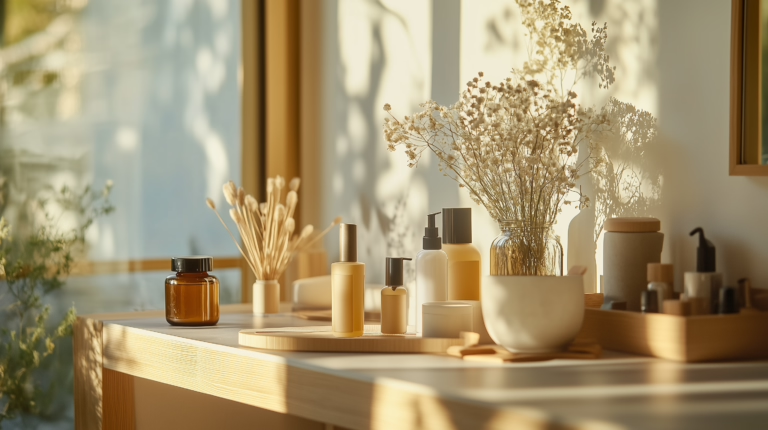Sleep’s Impact on Skin & Hair Health
Getting enough sleep is crucial for maintaining vibrant skin and healthy hair. When you skimp on sleep, it doesn’t just leave you feeling tired; it can also lead to common issues like oily skin and various hair problems. This is because sleep plays a vital role in the body’s ability to repair and regenerate skin cells and hair follicles. So, prioritising good sleep can be just as important as any product in your skincare and haircare routine.
During sleep, your body goes to work, healing, restoring, and eliminating toxins from the skin and scalp. This natural process helps to combat the appearance of oily skin and supports the strength and health of your hair. If you’ve been noticing your skin and hair aren’t looking their best, a closer look at your sleep habits might be the first step towards improvement.
How Sleep Affects Oily Skin

Sleep significantly impacts how our skin looks and feels, particularly when it comes to managing oily skin. During the night, our skin goes through a process of renewal and detoxification, which can be hindered by inadequate sleep. Lack of sleep disrupts the skin’s ability to balance oil and moisture levels, often leading to increased oiliness and the potential for breakouts and acne.
The relationship between sleep and oily skin is closely linked to the body’s natural rhythms. At night, the skin’s protective barrier becomes more permeable, allowing for better absorption of skincare products but also making it more vulnerable to moisture loss and imbalances. This is why a good night’s sleep is essential for maintaining the skin’s natural equilibrium, keeping oil production in check.
When we miss out on sleep, our body produces more cortisol, the stress hormone, which in turn can stimulate the oil glands to produce more sebum. This excess oil can clog pores, leading to acne and an overall greasy appearance. Thus, ensuring you get enough rest is a key strategy in managing oily skin effectively.
Moreover, sleep deprivation can exacerbate skin conditions, making oily skin appear worse. It’s not just about the quantity of sleep, but also the quality. Achieving deep, restorative sleep cycles is critical for the skin’s health, emphasizing the importance of establishing a regular sleep pattern for those struggling with oily skin.
Hormones and Oil Production

One of the primary ways sleep influences skin health is through the regulation of hormones, particularly cortisol. Cortisol levels naturally fluctuate throughout the day but are significantly impacted by our sleep patterns. When we don’t get enough sleep, cortisol levels spike, which can lead to an increase in oil production in the skin.
This hormonal imbalance not only makes your skin oilier but can also disrupt other skin functions, leading to irritation and inflammation. It’s a delicate balance, as these conditions can further compromise the skin’s barrier, making it more susceptible to issues beyond just oiliness, such as sensitivities and acne.
Understanding the link between sleep, hormones, and oil production is key to managing oily skin. By prioritizing sleep, you can help regulate cortisol levels, thus keeping oil production under control and supporting overall skin health. It’s a simple yet effective step towards a clearer, more balanced complexion.
Sleep’s Role in Hair Health

Just as sleep is essential for skin health, it also plays a critical role in maintaining healthy hair. During sleep, the body boosts blood flow to the skin, including the scalp, which nourishes hair follicles with essential nutrients and oxygen. This process is vital for promoting hair growth and preventing hair loss.
Lack of sleep can disrupt this natural cycle, leading to weaker hair strands, a slower growth rate, and increased susceptibility to damage. When the scalp receives inadequate nourishment due to poor sleep, it can result in hair that looks dull, lifeless, and is more prone to breakage. Thus, getting sufficient rest is a cornerstone of a healthy haircare routine.
Adequate sleep also supports the production of growth hormones, which contribute to hair follicle health. These hormones help in repairing and creating new cells, including those involved in hair growth. Consequently, optimizing your sleep schedule can have direct benefits for your hair, helping it to grow stronger and healthier.
Furthermore, stress, which is often exacerbated by poor sleep, can lead to conditions like telogen effluvium, where hair falls out more easily. By ensuring you get enough restful sleep, you can mitigate stress levels and its effects on your hair, underlining the importance of sleep in the quest for healthier, more robust hair.
Promoting Hair Growth

Good sleep is a powerful ally in promoting hair growth. During the deeper stages of sleep, the body enhances its regeneration processes, which includes rejuvenating the hair follicles. This regeneration is crucial for supporting the natural lifecycle of hair growth, contributing to stronger, longer hair.
Furthermore, sleep helps to regulate the hormones that are essential for healthy hair growth. Disruptions in sleep can lead to hormonal imbalances that may stifle hair growth or lead to hair loss. Therefore, ensuring you get enough quality sleep is a simple yet effective way to support your hair’s natural growth processes.
By prioritizing sleep, you’re not only giving your body the chance to repair and refresh itself, but you’re also creating an optimal environment for hair follicles to flourish. This approach, combined with a balanced diet and proper hair care, can significantly enhance your hair’s health and appearance.
Tips for Better Sleep to Improve Skin and Hair

Improving the quality of your sleep can have a profound impact on your skin and hair health. Establishing a consistent bedtime routine is a great start. This could include winding down activities an hour before bed, such as reading or taking a warm bath, to signal to your body that it’s time to rest.
Creating a comfortable sleep environment is also crucial. Ensure your bedroom is cool, quiet, and dark. Investing in a good quality mattress and pillows can significantly improve sleep quality, as can using comfortable, breathable bedding. These steps help facilitate deep, restorative sleep, which is essential for skin and hair health.
Managing stress is another key component of improving sleep. Practices like meditation, yoga, or even writing in a journal can help calm the mind before bed, making it easier to fall asleep and stay asleep. Reducing caffeine intake, especially in the latter part of the day, can also help prevent sleep disturbances.
Lastly, try to stick to a regular sleep schedule, even on weekends. Going to bed and waking up at the same time each day sets your body’s internal clock, making it easier to fall asleep and wake up naturally. This consistency not only improves sleep quality but also supports your body’s natural skin and hair renewal processes.
Establishing a Bedtime Routine
Setting up a bedtime routine is a powerful tool in improving sleep quality. Start by choosing activities that help you relax and unwind in the evening. This could be something like reading a book, listening to calming music, or practicing some gentle stretches. The key is to be consistent with these activities, as they signal to your body that it’s time to wind down.
It’s also helpful to limit exposure to screens at least an hour before bed. The blue light emitted by phones, tablets, and computers can interfere with your body’s natural sleep-inducing processes. Instead, focus on activities that don’t involve screens to help your body prepare for a night of restful sleep. By following these simple steps, you can establish a bedtime routine that enhances both your sleep quality and your skin and hair health.
Common Sleep Mistakes That Worsen Oily Skin

One of the key culprits behind exacerbated oily skin is an irregular sleep pattern. When your body lacks a consistent sleep schedule, it can throw off your internal clock, leading to stress that increases oil production. It’s crucial to aim for a regular bedtime to help manage the oil from the skin effectively.
Another common mistake is neglecting basic skin care before hitting the bed. A quick routine involving a gentle face wash to remove dead skin and a light face serum can work wonders. This simple step ensures your skin is clean, which prevents oil build-up and supports healthy, glowing skin as you sleep.
Bathing or taking a warm bath before bed isn’t just relaxing; it helps prepare your body and skin for a restful night. Warm water can help open pores, ensuring your evening skin care products penetrate deeper. However, be mindful to moisturize well afterwards to avoid dry skin, which can sometimes trigger more oil production in a bid to compensate.
Excessive screen time before bed is another habit that negatively impacts both sleep quality and skin health. The blue light emitted by screens can disturb your sleep cycle, further stressing your skin and exacerbating oiliness. Reducing screen time can lead to better sleep, reduced stress, and ultimately, less oily skin.
Reducing Screen Time Before Bed
To tackle oily skin through better sleep, start by limiting your exposure to electronic devices at least an hour before bedtime. This small change can significantly improve your sleep quality. Consider replacing screen time with a book or a relaxing bath to help your body wind down without the stimulating effects of blue light.
Remember, glowing skin and a rested body are interconnected. By keeping your devices away from the bedroom, you encourage a restful environment, essential for both good sleep and skin health. This simple adjustment can make a noticeable difference in managing oily skin and achieving radiant skin.
Setting Realistic Expectations for Results

Improving skin and hair health through better sleep is a journey that requires patience and consistency. It’s important to understand that while sleep plays a crucial role in maintaining healthy skin and promoting hair growth, changes won’t happen overnight. Incorporating good sleep habits into your routine is a step in the right direction for long-term benefits.
Alongside improved sleep, maintaining a balanced diet, staying hydrated to keep the skin hydrated, and practicing sun protection are vital. These actions work together to enhance the quality of your skin and hair. Remember, caring for your skin and hair is a holistic approach that goes beyond just sleep.
Setting realistic expectations means acknowledging that everyone’s body reacts differently based on various factors like age, skin type, and lifestyle. While some may see improvements in a few weeks, others may take longer. The key is to stay consistent and be patient with your body’s natural process.
Time frame for Visible Changes
Typically, you might start noticing improvements in your skin and hair health after consistently practicing better sleep habits for about 4 to 6 weeks. However, this timeframe can vary depending on individual health, skin type, and environmental factors. For some, the benefits of reduced oily skin and healthier hair might become noticeable sooner, especially with the integration of a comprehensive skin care routine.
It’s essential to keep track of your progress and not get discouraged if you don’t see immediate results. Healthy skin and hair are results of ongoing care, which includes proper sleep, nutrition, and skin care practices. By giving your body the time it needs, you’ll be on your way to achieving lasting improvements.
Wrapping Up and Next Steps
We’ve discovered the powerful impact that sleep can have on both your skin and hair health, including the management of oily skin and promoting hair growth. Remember, achieving oil control isn’t just about the right face cream; it’s also about giving your body the rest it needs to regulate hormones effectively. Additionally, caring for your skin goes beyond nighttime routines. During the day, protect your individual skin from sun exposure with a broad-spectrum sunscreen to lower the risk of skin cancer and prevent further damage.
Start implementing the sleep tips we’ve discussed and observe how your skin and hair begin to thrive. Be patient and consistent, as the timeframe for visible changes can vary. Your nails, skin, and hair will thank you for the extra care and attention. Encourage yourself to keep a positive outlook on these lifestyle adjustments, knowing that each step you take contributes to your overall well-being. Let’s embark on this journey towards healthier skin and hair together!







